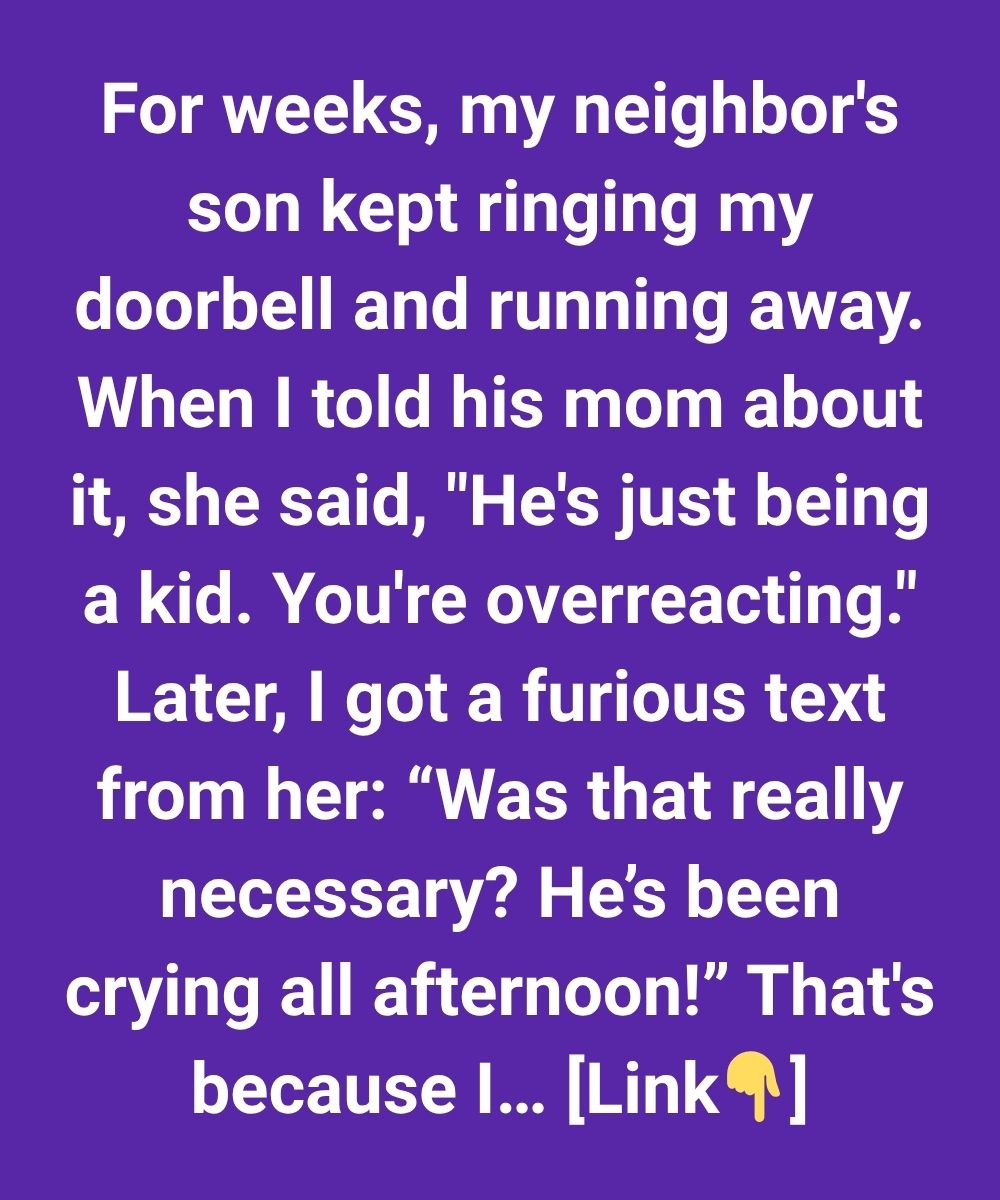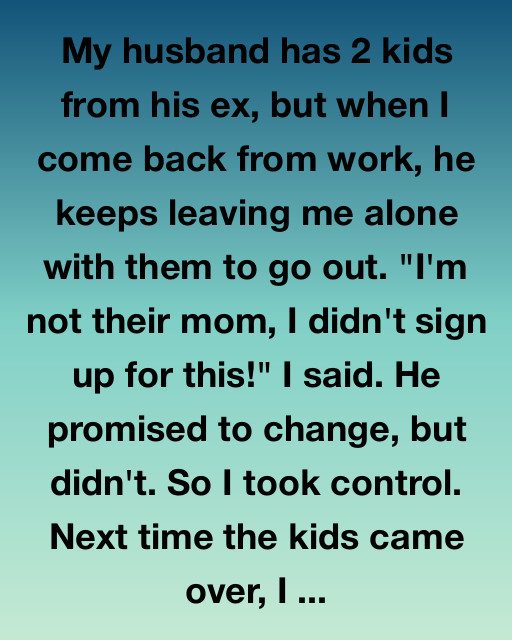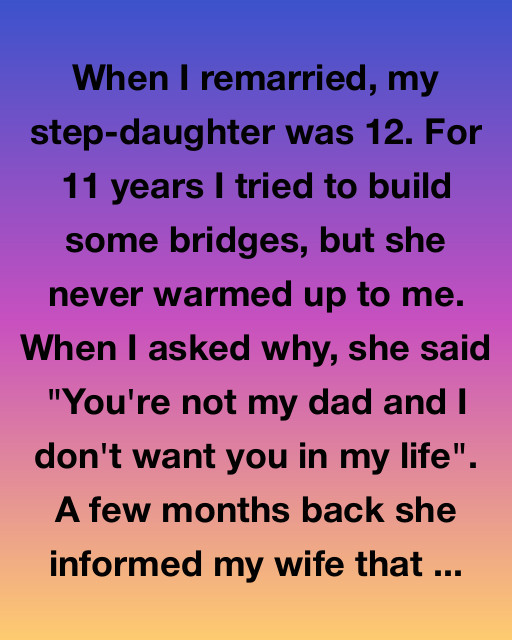For weeks, my neighbor’s son kept ringing my doorbell and running away.
When I told his mom about it, she said, “He’s just being a kid. You’re overreacting.”
Later, I got a furious text from her: “Was that really necessary? He’s been crying all afternoon!” That’s because I finally caught him on my doorbell camera, printed a screenshot, and taped it to her front door with a note that said: “Please stop.”
I wasn’t mean. I didn’t shout at him. I just wanted it to stop.
Her reaction honestly stunned me. I almost felt guilty. Almost.
But it kept happening.
Not every day, but often enough that I started to dread the sound of the doorbell. It was always around 5 p.m. Just before dinner. Sometimes when I had just sat down after a long shift. Once, I spilled hot tea on myself because of it.
I live alone. Always have. I’m not someone who complains about every little thing, but I do value peace.
The kid’s name was Rami. Seven years old, shaggy hair, always in that same faded green hoodie, even when it was warm. He wasn’t outright mean. He never said anything. But the way he stared sometimes—long after I opened the door and he was already halfway down the driveway—gave me this weird feeling I couldn’t quite shake.
I tried ignoring it.
I tried leaving a polite note for his mom, Sahar, again. This time I slid it in her mailbox, just asking if she could have a chat with him.
She never replied.
Instead, the next morning, I found dog poop on my front steps. I don’t own a dog.
Now I wasn’t sure if I was dealing with a prank or something more deliberate.
A week later, my car tires were slashed.
That’s when things stopped feeling like kid stuff.
I didn’t immediately assume it was Rami, obviously. But I also couldn’t help connecting the dots. And when I brought it up to Sahar—calmly, in person—she looked me in the eye and said, “You need to stop harassing my child.”
Harassing.
That word burned in my head for days.
I wasn’t the villain here. I was just asking for basic respect.
Then something changed.
It was a Friday. I came home from work and found a small, crumpled piece of notebook paper wedged into my front doorframe. It had one sentence in messy handwriting:
“I’m sorry. I don’t want to do it anymore.”
No name. But I knew it was Rami.
That night, I left a sandwich and juice box on my front porch, just in case. I wrote a little note on the napkin: “You’re always welcome to talk.”
The next morning, the food was gone. So was the note.
That weekend, no doorbell. No noises. Nothing.
For the first time in weeks, I could breathe.
But the quiet didn’t last.
Sunday night, just as I was dozing off, there was a knock. Not the doorbell—an actual knock. Soft, deliberate. I opened the door and found Rami standing there, alone, holding a broken toy truck.
He didn’t say anything at first. Just stood there, looking unsure.
“Hey,” I said gently. “Everything okay?”
He nodded, but his eyes were red. “Can I sit here for a bit?”
I didn’t know what to say. It felt like such a strange request.
But I let him sit on the porch swing while I made him some hot cocoa. No marshmallows, but he didn’t seem to mind.
We didn’t talk much. Just sat there. Then he looked at me and asked, “Do you think I’m bad?”
The question made my chest ache.
“Not at all,” I said. “But I think maybe something’s bothering you.”
That’s when the floodgates opened.
He told me things I never expected to hear from a seven-year-old. How his mom gets “too tired” sometimes and locks herself in her room for hours. How he has to make dinner by himself, mostly cereal or crackers. How sometimes she yells and cries after talking on the phone.
How the ringing doorbell was his way of making sure someone was out there.
I felt something shift inside me.
This wasn’t about a prank.
This was a kid trying to be seen.
Over the next few weeks, Rami started coming over more. Always staying outside. He never stepped past the porch unless I invited him, and I didn’t want to push too much. He told me about school, his favorite books, how he hated broccoli but liked Brussels sprouts (which honestly made no sense to me).
Sometimes, Sahar would text me vague messages like, “Thanks for keeping him busy,” or “He talks about you too much.”
But she never once came over. Never once apologized.
One day, Rami showed up with a black eye.
He tried to say he fell off his bike. But there was no scratch, no bruise on his arms or knees.
I wanted to call someone. Child services. The school counselor. Anyone.
But he begged me not to.
“Please. It’ll just make her worse.”
So I waited. I kept notes. Dates. Times. Photos, when I could.
I started volunteering at his school’s reading program just to keep an eye out. Quietly. Carefully.
And I started giving him extra food, packed snacks he could “accidentally forget” at home so he’d have something for lunch.
I wasn’t trying to be a hero. I just couldn’t sit by anymore.
Then came the twist I never saw coming.
Sahar went missing.
Not for good. Just for a weekend. But no one knew where she was.
Rami knocked on my door that Saturday morning with puffy eyes and a trembling voice.
“She left last night and didn’t come back.”
I let him in.
Called the police. They didn’t seem too concerned. Said she was an adult and maybe needed space.
But two days passed.
No messages. No updates.
When she finally showed up Monday evening, she looked completely different. Disheveled. Disoriented. Smelled like alcohol and cheap motel soap.
She didn’t even ask where Rami had been. Just took him by the arm and said, “Thanks. You can stop playing savior now.”
That was the final straw.
I made the report.
It wasn’t just about me anymore. It wasn’t about a doorbell or a prank.
It was about a child being slowly crushed under the weight of someone else’s mess.
I didn’t know what would happen next, but I couldn’t ignore it anymore.
Three weeks later, a caseworker came by to talk to me.
They asked questions. Wanted timelines. Proof.
I handed over everything.
They said Rami wouldn’t be taken away—at least not yet—but they were opening a case.
That same week, I noticed something different. Sahar stopped looking me in the eye. She didn’t glare anymore. She just looked tired. Beaten down by something even I couldn’t name.
Then, something even more unexpected happened.
She knocked on my door.
Not Rami. Her.
She was quiet. Holding a plastic container.
“I made some soup,” she said awkwardly. “Just… thanks. For not giving up on him.”
We talked on the porch for almost an hour. She told me about her husband leaving two years ago. How she’d lost her job recently. How she hated herself most days and had no idea how to be a good mom.
She cried. I listened.
I didn’t absolve her. I didn’t excuse anything. But I saw her humanity for the first time.
I told her I’d still be there—for Rami. And maybe, in time, for her too.
It wasn’t forgiveness. Not yet.
But it was a start.
Months passed.
Things slowly got better.
Rami started smiling more. Gained a little weight. His grades improved. He even joined the school choir.
Sahar started going to counseling. Voluntarily. She’d wave at me in the mornings, sometimes even smile.
I won’t pretend everything turned into sunshine and rainbows.
Some days were hard. There were setbacks. But there was also growth.
Real, visible change.
And one day, just as I was planting tomatoes in the yard, Rami ran up, hugged me tight, and said, “I don’t ring doorbells anymore.”
I laughed. “Yeah? Why’s that?”
“Because now, when I need something… I know you’ll answer.”
That moment hit me harder than anything else.
Because that’s all any of us want, right?
To know that when we knock—someone will answer.
If there’s one thing this whole wild ride taught me, it’s this:
Sometimes the people who seem like they’re causing trouble are actually the ones in the most pain.
A little patience. A little compassion. It can change more than just a situation—it can change a life.
💬 If this story touched you, share it with someone who might need a reminder to look a little deeper.
❤️ Like this if you believe second chances are real.
🙏 Let’s keep being the kind of neighbors the world needs more of.




